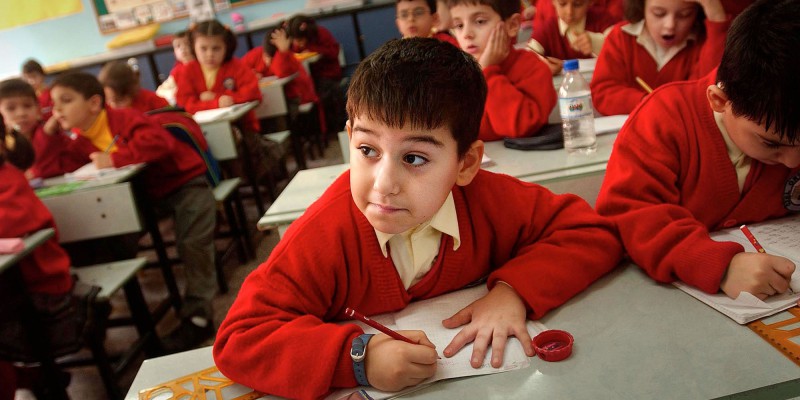Kerem Öktem比较了保加利亚和土耳其如何处理两国国内最大的少数民族的母语使用权问题。

不管是保加利亚还是土耳其都有众多的少数民族。在保加利亚,有8%-10%的人口是土耳其裔, 而在土耳其大约有15%的人口被认为自己是库尔德人。两国都有着各自的全国性传统,都被描述为对少数民族冷漠无情。在两国的教育机构和公众议题中,崇拜自我种族的民族主义风气还是很浓的,这几乎是一种社会规范。在这两个国家里,使用少数民族语言基本上会被看成是对民族团结和统一的一种威胁,所谓的民族团结和统一,就是在保加利亚就要讲保加利亚语,在土耳其就要说土耳其语。然而在一个国家里的哪里使用少数民族语言可以能被接受?在哪儿又要避免使用呢?这两个国家的政策规定大相径庭。
在欧盟成员国保加利亚,母语教育原则上是公民的一项权力,虽然没有被写入宪法,但是内阁形成的决议认为这是理所当然的。即使是在没有少数民族学校 (四大宗教学院除外)的时候,土耳其裔少数民族的儿童也有权接受自己民族的基础语言教育。然而,在执行这些规定时,在地方教育当局的微观政治中,学校却削 弱了这种公民的权利:要开一个土耳其语班,需要有土耳其语教师和至少12名的学生;而且还要自愿将土耳其语作为一门“外语选修课”,这些课程不被计入学生 的总分,它们必须与计算机知识教程和其他外语课程去竞争。有证据显示,中小学的校长都试图劝阻学生们不要去上土耳其语课。最后,在该国土耳其语教育机构中工作的土耳其语教师都要按照上面的口径说,这些机构是因为财政原因而关闭的。结果,在保加利亚仅有一小部分学生把土耳其语作为选修课,因此该国土耳其裔的母语语言能力在倒退,许多土耳其裔人的保加利亚文说得比土耳其文还流利。
过去8年来,保加利亚电视台每天用土耳其语播放15分钟的新闻,尽管这是该国为 75万土耳其人在保加利亚制作的唯一一套土耳其语电视节目,反对播出该节目的声浪仍然此起彼伏,因为它被指称促进了一门外语。就连总理博伊科·鲍里索夫都支持这一反对运动,理由是保加利亚只有一个官方语言:保加利亚语。所以这一午间播出的每日土耳其语新闻节目,前途难料。
在欧盟候选国土耳其,中小学层面基本没有少数民族语言的教育,除了有限的几家非穆斯林少数民族学校外。库尔德人学校的孩子们得不到库尔德语教育。不 管怎样,过去几年里,各大学的库尔德语系和库尔德文学系都已开放,在库尔德地区的大学里库尔德学位的课程也很普遍。开办私立库尔德语言班的可能性也是存在 的,然而,地方教育机构的检察官员们则坚持认为,修建校舍的计划书夸大其词,因此该课程发展的速度就放慢了。很多已开课程不得不收取高额费用,也难有机会 进入目前最贫困的社区,如今这些课程大部分都已经停课。
在媒体方面,过去几年来形势显著不同,土耳其国家电视台TRT6频道每天播放24小时库尔德语的节目,目前又有两家私人电视台加入了TRT6的行列,每天也在播放24小时的库尔德语节目。























reply report Report comment
Dear Friends,
I am a Kurdish/Turkish girl living in Lebanon, holding both IDs, the Lebanese and the Turkish. My grandfather moved to Lebanon because of the Turkish violation against kurds and the breach of their rights. They have suffered long history with discrimination and persecution in many surrounding countries as well. They were not allowed to raise their flag nor use their native language (that is the reason why I am weak in speaking kurdish!). Both sides hope for a peaceful settlement to avoid bloody civil war. The mass Kurdish exodus from Iraq triggers foreign government and public opinion to firmly engage on the kurdish question.
reply report Report comment
Dear colleague,
I am somewhat puzzled by your conclusion that Turkish people in Bulgaria are more and more fluent in Bulgarian. As far as I know it is exactly the opposite — they know less and less Bulgarian, although this does not mean that all is good with the Turkish language education. Can you please quote your sources of information, academic, statistic or others?
Milena Borden (Dr. UCL-SSEES)
reply report Report comment
Very nice example of collaboration between two nations.
reply report Report comment
Dear mpetkova,
Thank you very much for your thoughtful comments.
You are right about the DPS’ importance for the Turkish community (there, however, several Turkish parties in Macedonia, I should add).
What I conclude from my fieldwork is that the DPS needed to walk a very fine line as ethnic politics are unconstitutional in Bulgaria. It seems that while they were perceived as a ‘Turkish party’, they had to take great care in demonstrating their commitment to being a ‘Bulgarian’ party, hence also including Bulgarians from other backgrounds. For what reason exactly one might disagree, but the DPS seems to have been much better in clientelist politics than in expanding the rights of the Turkish and other minorities.
In fact, this does resound a bit with the Turkish case, where there also is a de-facto Kurdish party (BDP), which is legal but the moment it crosses into the territory of Kurdish identity politics is ruthlessly prosecuted.
By the way, after writing this case, I received news of the Bulgarian Parliament’s apology for the “Renaissance” campaign. I wonder what you think about it? Is it a sign that things might be about to change?
Best wishes
http://setimes.com/cocoon/setimes/xhtml/en_GB/features/setimes/features/2012/01/18/feature-01
reply report Report comment
Thank you, Kerem, for this insightful article. Indeed, the rights of the Turkish minority in Bulgaria have long been abused. Towards the end of the communist regime, the party leadership sought the escalate ethnic tensions in my country by launching the so-called “Renaissance Process” to change the names of all Turks to “Bulgarian” ones. Of course, this resulted in violence, arrests, and even deaths and thousands of embittered Turks left. Since the fall of the regime and its pro-ethnic-tension politics in Bulgaria, there has not been an attempt to re-think recent history and launch discussions on the position of minorities in the country because our amateurish political elite cannot move beyond populism. Furthermore, the way history is taught in Bulgarian textbooks has not changed since 1989, so all propaganda targeting the “Western NATO enemy” Turkey has not been removed. To this day Bulgarians cannot come to terms with the Ottoman conquest. It’s been 150 years already. So do not be surprised about the petitions against the 15-minute news in Turkish. I do have to note, however, that unlike many of our neighbors, we have had a Turkish party (DPS) in parliament since 1989. How representative they are of the Turkish minority is another question.